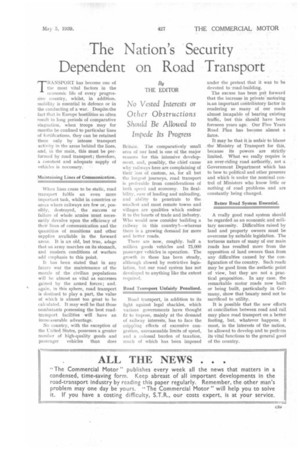The Nation's Security Dependent on Road Transport
Page 89

If you've noticed an error in this article please click here to report it so we can fix it.
By
THE EDITOR TRANSPORT has become one of the most vital factors in the economic life of every progressive country, whilst, in addition, mobility is essential in defence or in the conducting of a war. Despite the fact that in Europe hostilities so often result in long periods of comparative stagnation, when troops may for months be confined to particular lines of fortifications, they can be retained there only by intense transport activity in the areas behind the lines, and, in the main, this must be performed by road transport; therefore, a constant and adequate supply of vehicles is necessary.
Maintaining Lines of Communication.'
When lines cease to be static, road transport fulfils an even more important task, whilst in countries or areas where railways are few or, possibly, destroyed, the success or failure of whole armies must necessarily devolve upon the efficiency of their lines of communication and the quantities of munitions and other supplies available in the forward areas. It is an old, but true, adage that an army marches on its stomach, and modern conditions of warfare add emphasis to this point.
It has been stated that in any future war the maintenance of the morale of the civilian populations will be almost as vital as successes gained by the armed forces ; and, again, in this sphere, road transport is destined to play a part, the value of which is almost too great to be calculated. It may well be that those combatants possessing the best roadtransport facilities will have an rm ne a surable advantage.
Na country, with the exception of the United States, possesses a greater number of high-quality goods and passenger vehicles than does
Britain. The comparatively small area of our land is one of the major reasons for this intensive development, and, possibly, the chief cause why railways here are complaining of their loss of custom, as, for all but the longest journeys, road transport is preferable from considerations of both speed and economy. Its flexibility, ease of loading and unloading, and ability to penetrate to the smallest and most remote towns and villages are qualities which endear it to the hearts of trade and industry. Who would now consider building a railway in this country?—whereas there is a growing demand for more and better roads.
There are now, roughly, half a million goods vehicles and 75,000 passenger vehicles in operation. The growth in these has been steady, although slowed by restrictive legislation, but our road system has not developed to anything like the extent required.
Road Transport Unfairly Penalized.
Road transport, in addition to its fight against legal shackles, which various governments have thought fit to impose, mainly at the demand of railway interests, has to face the crippling effects of excessive congestion, unreasonable limits of speed, and a colossal burden of taxation, much of which has been imposed under the pretext that it was to be devoted to -road-baikling.
The excuse has been put forward that the increase in private-motoring is an important contributory factor in rendering so many of our roads almost incapable of bearing existing traffic, but this should have been foreseen years ago. Our Five Years Road Plan has become almost a farce.
It may be that it is unfair to blame the Ministry of Transport for this, because its powers are strictly limited. What we really require is an over-riding road authority, not a Government Department which has to bow to political and other pressure and which is under the nominal control of Ministers who know little or nothing of road problems and are constantly being changed.
Better Road System Essential.
A really good road system should be regarded as an economic and military necessity. Difficulties raised by land and property owners must be overcome by suitable legislation. The tortuous nature of many of our main roads has resulted more from the opposition of land owners than from any difficulties caused by the configuration of the country. Such roach; may be good from the iesthetic point of view, but they are not a prac. tical proposition. In any case, the remarkable motor roads now built or being built, particularly in Germany, show that beauty need not be sacrificed to utility.
It is possible that the new efforts at conciliation between road and rail. may place road transport on a better footing, but, whatever happens, it must, in the interests of the nation, be allowed to develop and to perform its vital functions to the general good of the country.
































































































































































